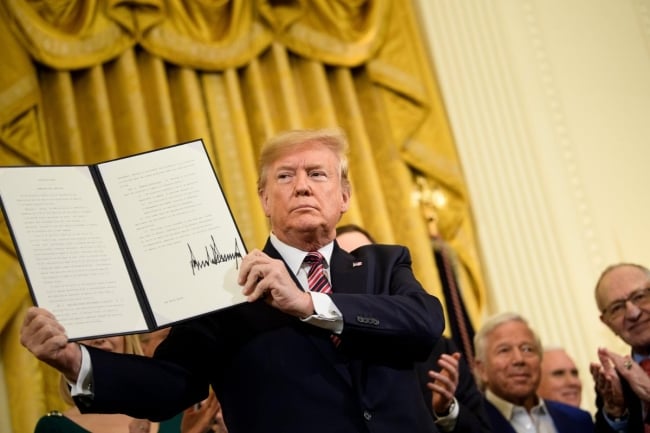You have /5 articles left.
Sign up for a free account or log in.

Pictured in 2019, then-president Trump holds an executive order that directed federal agencies to utilize the IHRA definition of antisemitism in Title VI enforcement.
Brendan Smialowski/AFP via Getty Images
President Trump on Wednesday signed an executive order focused on anti-Semitism on college campuses, drawing praise from some quarters and concerns from others about implications for free speech on campuses.
The executive order instructs agencies to "consider" a definition of anti-Semitism from the International Holocaust Remembrance Alliance in investigating complaints of discrimination under Title VI of the Civil Rights Act of 1964. The IHRA definition is controversial in higher education because it encompasses some forms of anti-Israel speech.
The definition includes a list of various forms that contemporary anti-Semitism can take. Such forms include “denying the Jewish people their right to self-determination, e.g., by claiming that the existence of a State of Israel is a racist endeavor,” or “applying double standards by requiring of it a behavior not expected or demanded of any other democratic nation.” The definition states, however, that "criticism of Israel similar to that leveled against any other country cannot be regarded as antisemitic."
"The Remembrance Alliance definition makes clear what our administration has stated publicly and on the record," Jared Kushner, a senior adviser to Trump, wrote in an op-ed about the order published in The New York Times. "Anti-Zionism is anti-Semitism. The inclusion of this language with contemporary examples gives critical guidance to agencies enforcing Title VI provisions."
Advocates of campus free speech rights argued that instructing federal agencies to adopt the IHRA definition to aid in their enforcement of Title VI could chill speech critical of Israel.
“Directing federal agencies to rely on this framework in enforcing Title VI would effectively order nearly every campus in the country to censor its students and faculty on the basis of viewpoint -- in this case, constitutionally protected speech that is critical of Israel,” the Foundation for Individual Rights in Education said in a statement. “This result would be sharply at odds with our national commitment to freedom of speech and academic freedom, decades of First Amendment precedent, and the President’s stated concern for protecting free speech on campus.”
Title VI prohibits colleges that receive federal funding from discriminating based on race, color or national origin. While religion is not a protected category under the statute, guidance from the Department of Education's Office for Civil Rights issued in 2010 noted that harassment against members of a religious group “triggers a school’s Title VI responsibilities when the harassment is based on the group’s actual or perceived shared ancestry or ethnic characteristics, rather than solely on its members’ religious practices.”
Trump's order reiterates that general sentiment. It states "discrimination against Jews may give rise to a Title VI violation when the discrimination is based on an individual’s race, color, or national origin."
"It shall be the policy of the executive branch to enforce Title VI against prohibited forms of discrimination rooted in anti-Semitism as vigorously as against all other forms of discrimination prohibited by Title VI," the executive order continues.
The Anti-Defamation League, a group that fights anti-Semitism, welcomed the executive order. The group has tracked a large increase in reported anti-Semitic incidents on college campuses since 2016.
“Anti-Semitism on campus is a critical issue and we at ADL have supported bipartisan efforts to improve the federal tools to combat it for years,” Jonathan A. Greenblatt, ADL’s CEO, said in a statement. “In a climate of rising anti-Semitism, this Executive Order provides valuable guidance on anti-Semitism, giving law enforcement and campus officials an important additional tool to help identify and fight this pernicious hate. It also reaffirms protection of Jews under Title VI without infringing on First Amendment rights. These are all important steps forward.”
Cary Nelson, the Jubilee Professor of Liberal Arts and Sciences Emeritus at the University of Illinois at Urbana-Champaign and a prominent figure in the movement opposing an academic boycott against Israel, said the IHRA definition is enormously useful.
“I’m a fan of the definition because I think its educational value is real and I think it helps comprehension; I think that it helps you understand contemporary anti-Semitism,” he said. At the same time, he said he was reserving judgment about whether it was a good thing for it to be enshrined in an executive order dealing with enforcement of civil rights law.
“My guess is if there is an effort to apply it in some given case and that really is problematic there will be a very intense debate, a very public debate, which I think will be chastening if it is misapplied,” Nelson said.
Rabbi Alissa Wise, the director of Jewish Voice for Peace, an organization that supports the boycott, divestment and sanctions movement against Israel, said she fears the order may "incentivize administrators in a certain way to curtail activism for Palestinian rights on their campuses."
"Administrators are already disincentivized to allow that," she said. "They already have a lot of right-wing pressures and attacks coming on them from donors and anti-Palestinian advocacy groups. My fear is that when administrators learn that allowing students to advocate for Palestinian rights on campus will garner the attention of the federal government and possibly a Title VI investigation and put federal funding at risk, that administrators will create stricter rules."








